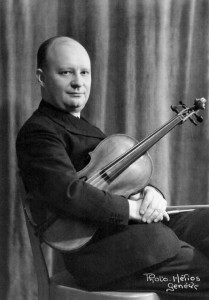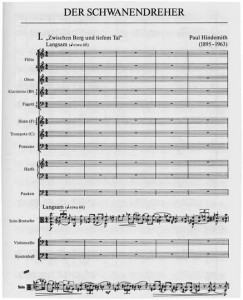I’ve always had a special love for recordings of important classical pieces that were made by their composers. A great many classical composers of significance have made recordings, and four of them, Leonard Bernstein, Benjamin Britten, Sergei Rachmaninoff, and Richard Strauss, were world-class performers who would likely have become famous had they never written a note. Quite a few others—Barber, Bartók, Debussy, Elgar, Poulenc, Prokofiev, Saint-Saëns, and Shostakovich come immediately to mind—also made accomplished recordings, usually but not always of their own music.
On the other hand, some of the best-known composer-performers, judging by their records, left a certain amount to be desired in the technique department. Aaron Copland and Igor Stravinsky, for instance, were excellent pianists but fair-to-middling conductors whose recordings, interesting though they always are, cannot necessarily be taken at face value as representative documents of their interpretative intentions.
Stravinsky’s conducting, both on and off record, was the source of much controversy during his lifetime, and qualified observers of his live performances not infrequently spoke scathingly of them. Paul Hindemith, who heard Stravinsky conduct three of his ballets in New York in 1935, described the results bluntly in a letter to his wife:
It began with Apollo, the music of which struck me today as very corpse-like; this must surely have been because the good Igor is a truly mediocre conductor and cunningly avoids any step in the direction of free and spontaneous music making.
 I quote from this letter because it was written around the time that Hindemith, who was also a violist, recorded his own Der Schwanendreher with a chamber orchestra led by none other than Arthur Fiedler, the Boston Pops man. In his youth Hindemith won high praise for his playing, but he didn’t practice much (if at all) after he became a famous composer, and by 1929, when he gave the premiere of William Walton’s Viola Concerto in London, his playing, as Walton remembered it, wasn’t exactly what you’d expect from a virtuoso: “His technique was marvelous, but he was rough—no nonsense about it. He just stood up and played.”
I quote from this letter because it was written around the time that Hindemith, who was also a violist, recorded his own Der Schwanendreher with a chamber orchestra led by none other than Arthur Fiedler, the Boston Pops man. In his youth Hindemith won high praise for his playing, but he didn’t practice much (if at all) after he became a famous composer, and by 1929, when he gave the premiere of William Walton’s Viola Concerto in London, his playing, as Walton remembered it, wasn’t exactly what you’d expect from a virtuoso: “His technique was marvelous, but he was rough—no nonsense about it. He just stood up and played.”
Hindemith’s recording of Der Schwanendreher, made in Boston in 1935, leaves no doubt of the continuing decline in his playing. His technique is infirm, his intonation slightly but perceptibly erratic. When he played the same piece four years later with the San Francisco Symphony, Alfred Frankenstein made no secret of his displeasure:
To be perfectly frank, another thing that did not live up to specifications was Hindemith’s viola playing. His records are magnificent, but yesterday afternoon the tone seemed somewhat wiry and strained and devoid of the mellow quality, characteristic of the instrument.
Small wonder that Hindemith ceased shortly thereafter to appear in public as a soloist.
 Why, then, would anyone want to listen to Hindemith’s recording of Der Schwanendreher? One reason, of course, is that any recording by a major composer is worth hearing. Assuming that he himself found it satisfactory—and we know from his letters that he enjoyed working with Fiedler—it tells us by definition something of interest about his interpretative intentions. But I hear something else in this 1935 recording. To me it is…well, a relic, in the specifically religious sense of the word.
Why, then, would anyone want to listen to Hindemith’s recording of Der Schwanendreher? One reason, of course, is that any recording by a major composer is worth hearing. Assuming that he himself found it satisfactory—and we know from his letters that he enjoyed working with Fiedler—it tells us by definition something of interest about his interpretative intentions. But I hear something else in this 1935 recording. To me it is…well, a relic, in the specifically religious sense of the word.
Pretty much everyone now agrees that Hindemith was at the very least an important composer, and I happen to think he was a great one. In 2002 I called him “the last German master of music,” uneven but true, who at his not-infrequent best was capable of turning out “pieces of extreme beauty.” The slow movement of Der Schwanendreher, which is based on two German folksongs, is one of those pieces, and Hindemith wrote it at a time when it was becoming evident to him that the German musical culture in which he was so deeply rooted was being poisoned by Nazism. He emigrated three years after recording Der Schwanendreher, setting up shop as a professor of music at Yale and, in due course, becoming an American citizen.
While we cannot know what was going through Hindemith’s mind when he recorded this piece, I like to think that he was remembering the soon-to-be-lost world of his youth, and that his playing—a bit scratchy, a bit shaky, but audibly heartfelt—was a requiem of sorts for what he was in the process of losing. I can’t believe that it was a coincidence that the first of the two folksongs on which this movement is based is a song of sorrow: Shed your leaves, little linden tree,/I can bear it no longer:/I have lost my love,/And today is mournful.
So hear, if you will, the melancholy sound of a middle-aged viola player whose technique had gone to seed. That is your privilege, but I hear something else, something infinitely precious, something that brings middle-aged tears to my eyes each time I listen.
* * *
Paul Hindemith plays the second movement of Der Schwanendreher in 1935, accompanied by Arthur Fiedler’s Sinfonietta:
